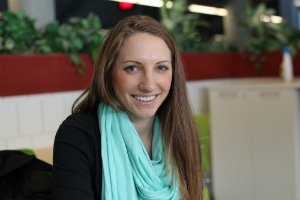Student Profile: Kathryn Klarich (CivE, 2014)

We all find our own way through life—and through college. Three graduates illustrate three successful, albeit different, paths through a civil engineering education at the University of Minnesota. Steven Borntrager made an effort to connect with students and involve himself in on-campus activities. Kathryn Klarich sought out opportunities to travel, and Noah Kimmes aimed for graduate school.
Kathryn Klarich (CivE, 2014) started her academic career at UMN as a freshman in the College of Science and Engineering in 2009. She was good at science, but confesses that she never liked math.
“Until my senior year in high school, I thought I wanted to go into something in liberal arts—I was really interested in writing. I was also really interested in environmental science, and so when I was applying to colleges, my dad suggested engineering. I was watching some videos from Engineers Without Borders and thought that looked pretty cool. So it was my dad’s suggestion and my research that led me here.”
Kathryn has participated in several research and travel projects in her time as an undergraduate.
“I worked with Professor John Gulliver starting out as a freshman. He let me co-author the paper on our research project. He let me have a lot of independence, even though I’m sure he could have done things ten times faster. Having skills in research and writing helped me to advance. I attribute a lot of my success to having that really valuable experience early on.”
“When I was a first year student, I went to Central Europe on a May term with Professor Henryk Stolarski (from Poland) and Senior Research Associate Sonia Mogilevskaya (from Russia). We went to 5 different countries learning about civil structures.”
“The Acara program had a huge impact on me. The idea of the Acara program is to identify a problem that can be addressed by a business solution. We tried to find a business incentive for vendors to improve food safety in India.”
Kathryn’s Acara team continued working together and developed a new business called Twin Fin Aquaponics. “We are raising fish and greens indoors. We hope it will allow us to deliver greens in the Minneapolis area, especially in winter when greens would normally have to be shipped from California or even further. On the Twin Fin team, I am mostly responsible for water quality related issues.”
“Over the 2013 winter break I traveled to Tanzania with Paul Strykowski, the Associate Dean for Undergraduate Programs in CSE. Our job was to design a new drinking water system for the village we stayed in. My team of 4 went and stayed in a small village for 3 days. We talked to people in the community, asked about their current situation, and tried to design a cost-effective solution for them.” ( http://blog.lib.umn.edu/itcomm/ learningabroad/2014_global_ seminars/tanzania_2014/ )
“In my Capstone course, I am working on a city waste water treatment plant. The city is exceeding the limits set on the amount of nitrogen. The problem is complicated and it is difficult to nail down one cause; I think that is the way a lot of problems are, so it is good to go through that process.”
“It is difficult to balance not only schoolwork, but also social life and activities, too. It took me about 4 years to figure out how to sleep and have friends and go to school. I used to just not sleep a lot! Perfectionists, like me, fear that things will really fall apart. And for me, not liking math, I felt I was maybe not as smart as everyone else, so I tried to overcompensate. I finally realized that if I could stay focused for 2 hours I would be more effective than if I sat for 6 hours at half focus. And I could be more focused if I slept more. That was a key realization. You have to be well rested to focus.”
Kathryn already has a job lined up. “I am currently working for Barr Engineering. I work there part time now and will start full time once I graduate. I will be a Water and Waste Water Engineer.”
“A lot of the classes I’ve taken have been directly related to the water work I do now. Being a student at the U has opened up a lot of opportunities I would not have had otherwise. I would say probably half of what I know how to do is from my classes and half is from the various internships, research projects, and start-up companies I have been involved with.”
Acara is a social entrepreneurship program of the University of Minnesota Institute on the Environment.